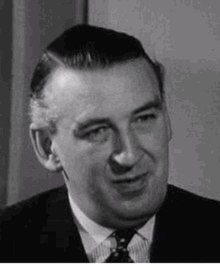Rowland Baring, 3rd Earl of Cromer
|
Lieutenant-Colonel The Right Honourable The Earl of Cromer KG GCMG MBE PC |
|
|---|---|
 |
|
| British Ambassador to the United States | |
|
In office 1971–1974 |
|
| Monarch | Elizabeth II |
| President |
Richard Nixon Gerald R. Ford |
| Prime Minister |
Ted Heath Harold Wilson |
| Preceded by | John Freeman |
| Succeeded by | Sir Peter Ramsbotham |
| Governor of the Bank of England | |
|
In office 1961–1966 |
|
| Preceded by | The Lord Cobbold |
| Succeeded by | Sir Leslie O'Brien |
| Personal details | |
| Born |
George Rowland Stanley Baring 28 July 1918 |
| Died | 16 March 1991 (aged 72) London, England |
| Nationality | British |
| Alma mater | Trinity College, Cambridge |
| Occupation | Banker, diplomat |
Lieutenant-Colonel George Rowland Stanley Baring, 3rd Earl of Cromer, KG GCMG MBE PC (28 July 1918 – 16 March 1991), styled Viscount Errington before 1953, was a British banker and diplomat. After serving during the Second World War, he was Governor of the Bank of England (1961–1966) and British Ambassador to the United States (1971–1974).
The eldest son of the 2nd Earl of Cromer and his wife Ruby Elliot-Murray-Kynynmound, he was educated at Eton and Trinity College, Cambridge, where he left after a year. He served with the Grenadier Guards during the Second World War, where he gained the rank of Lieutenant-Colonel and became a Member of the Order of the British Empire.
After serving as private secretary to the Freeman Freeman-Thomas, 1st Marquess of Willingdon in 1938, he joined Barings Bank, founded by his ancestor Sir Francis Baring, as a clerk. After military service during the war, he was managing director of Barings between 1949 and 1959 He then served as Economic Minister at the British Embassy in Washington as well as holding executive directorships at the International Monetary Fund, the International Bank for Reconstruction and Development, and the International Finance Corporation.
...
Wikipedia
